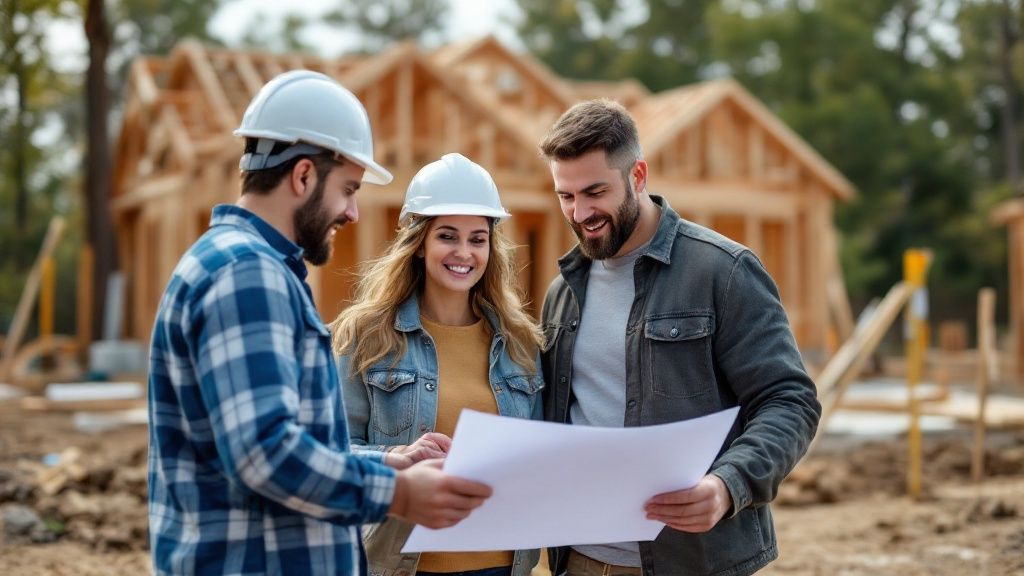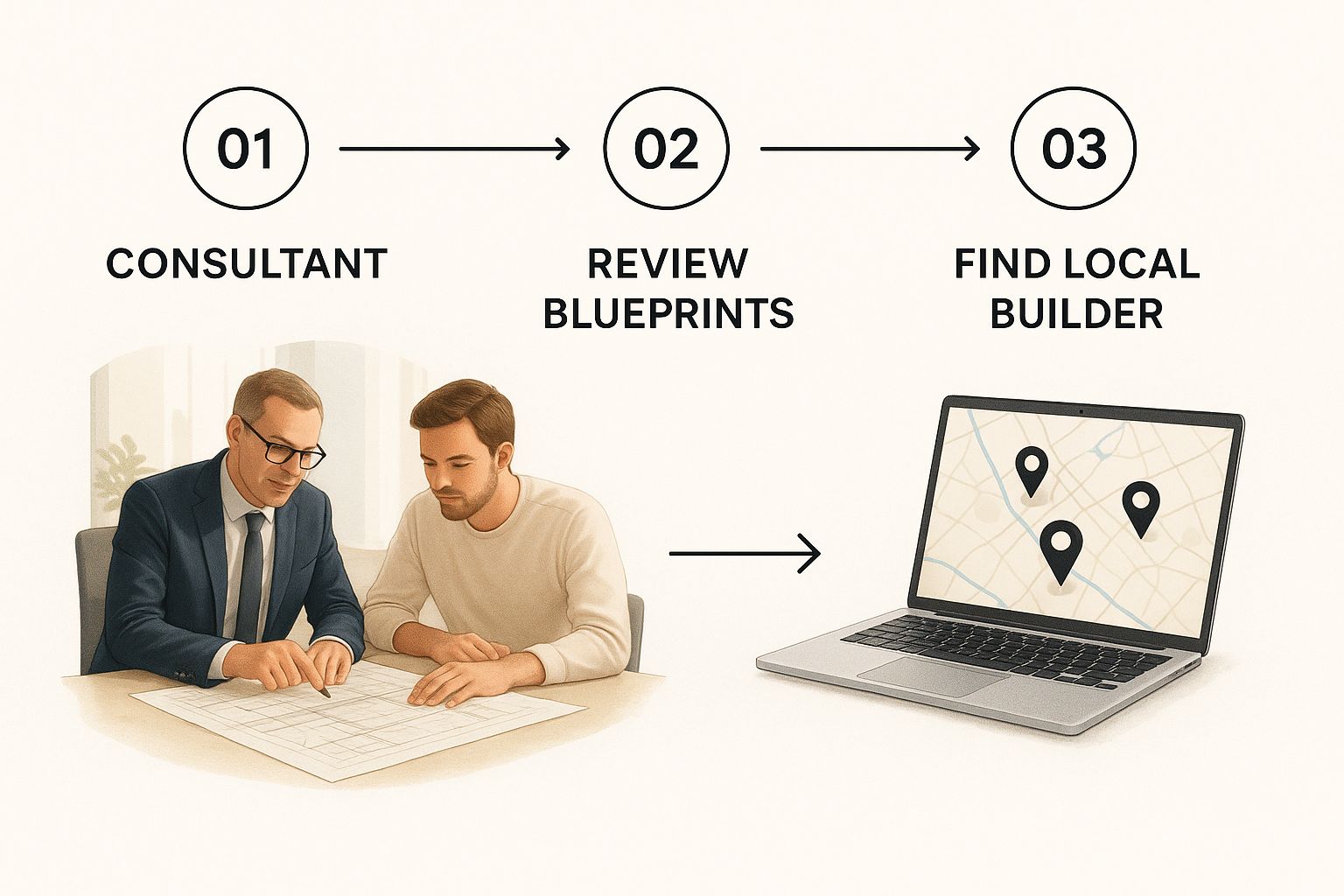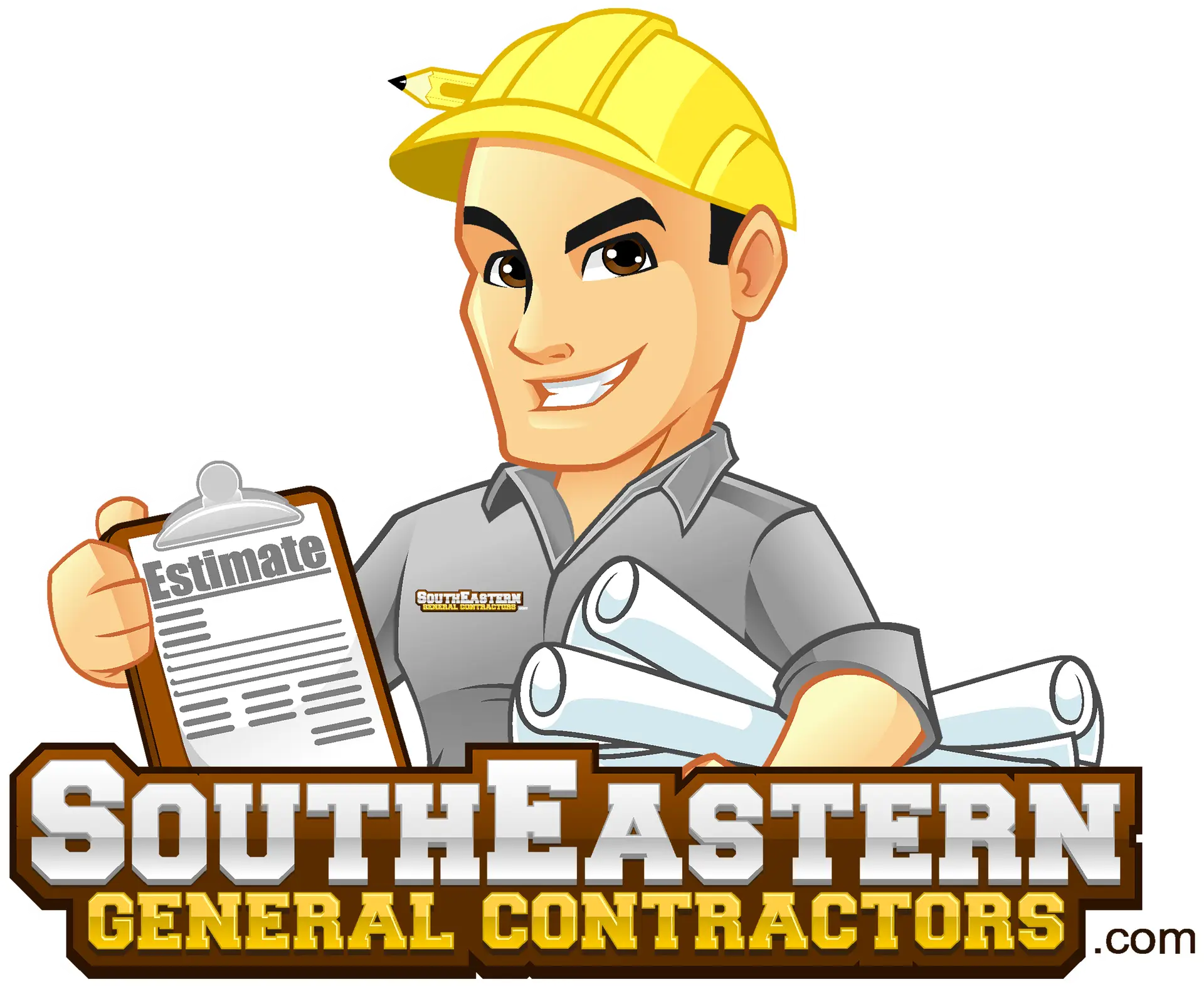
Finding “Build On Your Lot Builders Near Me” You Can Trust
So, you've got the perfect piece of land. The one you've pictured your future on. Now comes the exciting part: finding the right "build on your lot builder near me" to make that dream a reality. This isn't just about building a house; it's about partnering with someone who can transform that patch of dirt into a family legacy, combining your vision with their expertise.
The goal? A home that is 100% yours, from the way the morning sun hits the kitchen in your Fayetteville lot to the very last doorknob in your Lumberton retreat.
Starting Your Custom Home Journey

Taking on a build-on-your-lot project is, without a doubt, one of the most fulfilling ways to create a new home. Forget trying to fit your life into a pre-existing floor plan. This process flips the script entirely. You're in the driver's seat, designing a space that fits your lifestyle, your family, and the unique personality of your property.
The freedom is unmatched. You call the shots on the layout, you hand-pick every material, and you make sure the finished home is a perfect reflection of you. For a lot of people, this is what real homeownership is all about.
Why More People Are Choosing Custom Builds
The desire for a truly personal home is surging. You can see it in the numbers. The custom home building world, which includes all these build-on-your-lot projects, is booming.
Believe it or not, custom home starts hit 184,000 over the last year—a solid 2% jump from the year before. This corner of the market now accounts for about 19% of all new single-family homes, its biggest slice of the pie since 2022. If you're curious, you can dig into the full custom home building growth trend from the NAHB.
This isn't just a statistic; it's a signal. Homeowners are tired of settling. They're choosing to invest their time and money into creating something that’s built just for them, from the ground up.
"A great builder doesn't just construct a house; they build a relationship founded on trust. From the first handshake to the final walkthrough, our role is to be your advocate, guide, and expert partner." – Scottie Chavis, Founder of SEGC
With over 21 years of proven results building legacies in communities like Fayetteville and Lumberton, we at South Eastern General Contractors (SEGC) have been on this journey with countless families. We get it. That's why we've built our entire process around collaboration and straight talk, so you feel empowered and in control from start to finish.
As a Native American-owned, 8(a), and HUBZone-certified firm, our roots in quality and community run deep. We believe building your dream home should be an adventure, not an ordeal. And that adventure starts by finding a builder you can genuinely trust—not just with the blueprints, but with the future you're building for your family.
Finding and Researching Local Builders
Alright, you’ve fired up Google and typed in “build on your lot builders near me.” The search results are rolling in, but let’s be honest—finding the right partner for your dream home is a whole lot more involved than just clicking on the top ad. This is about finding a true craftsman, not just a company with a good web designer.
So, where do you start digging for gold? Forget the endless scroll for a minute and turn to the people who are already in the know.
- Your Local Home Builders Association (HBA): Think of this as the builder's honor roll. Members usually have to meet certain professional standards and follow a code of ethics. It's a great first cut.
- Real Estate Agents: The good ones, especially those who deal in land or new construction, have seen it all. They know which builders are a dream to work with and which ones cause nightmares. Their little black book is invaluable.
- Go for a drive: Seriously. Cruise through new developments or neighborhoods you love. Look for job sites. Is the site clean and organized, or does it look like a tornado hit it? That first impression tells you a lot about their professionalism.
This is your roadmap for taking a long list of names and whittling it down to the perfect builder for your land.

The foundation of a great build isn't concrete; it's solid, thorough research. You want someone with a rock-solid track record right in your backyard.
Putting Your Shortlist Under the Microscope
Once you have a handful of promising candidates, it's time to roll up your sleeves and do some real detective work. You’re moving past the initial search and into the nitty-gritty of vetting each one. Their website and online presence are your first stop.
Get lost in their portfolio. Are they building the kind of home you're picturing? Does their style match yours? A builder with a ton of experience in areas like Lumberton or Fayetteville has a huge leg up. It means they’ve mastered the local permitting process, they know the building inspectors, and they have solid relationships with the best local suppliers. That kind of local leadership is priceless.
Next up, become an expert on their reviews. Don't just skim the five-star ratings. Hunt for the details in client testimonials. Are people consistently praising their communication? Do they talk about the project staying on budget? A couple of grumpy reviews aren't a red flag, but a pattern of the same complaints definitely is. For a deeper dive, our guide on how to find a good contractor has even more tips.
Here at SEGC, we’ve always said our reputation is built on client trust, not just timber and nails. We’ve spent over 21+ years earning that trust, one family and one home at a time. That’s our real legacy in Fayetteville and beyond.
Before you make any calls, it helps to have a system. Here's an actionable insight: use a simple checklist to keep your thoughts organized as you compare different builders.
Your Builder Vetting Checklist
Use this checklist to evaluate potential 'build on your lot' contractors and find the right fit.
| Evaluation Area | What to Look For | Why It's Critical for Your Project |
|---|---|---|
| Local Experience | A deep portfolio of homes built specifically in your county or region. | They'll know the local soil, permitting quirks, and best subcontractors, avoiding costly delays and headaches. |
| Portfolio Match | Do the style, size, and quality of their past projects align with your vision? | You want a builder who specializes in your dream home style, not one who is trying it out for the first time. |
| Client Reviews | Consistent themes of good communication, transparency, and on-time/on-budget delivery. | This shows you how they handle the stress of a project and treat their clients when things get tough. |
| Licenses & Insurance | Proof of current general contractor license and comprehensive liability insurance. | Non-negotiable. This protects you from financial and legal disaster if something goes wrong on-site. |
| Communication Style | Are they responsive? Do they answer your questions clearly and respectfully? | Building a home is a long-term relationship. You need a partner you can actually talk to. |
This isn't just about ticking boxes; it's about finding a partner you can genuinely trust with the biggest investment of your life.
The Credentials That Really Matter
Beyond a pretty portfolio, certain credentials can speak volumes about a builder’s stability and character. Certifications like Native American-owned, 8(a), and HUBZone aren't just fancy acronyms. They indicate that a company has passed rigorous government vetting processes, proving its reliability and commitment to the community. These are signs you're dealing with a serious, long-term business built on quality.
It can also be insightful to see how leading home builders present themselves, even if they aren't local. The best companies share a commitment to quality and transparency that shines through in their work, no matter where they build.
Asking The Right Questions In Your First Meeting
Alright, you’ve done your homework. You’ve sifted through portfolios, stalked builder websites, and finally have a shortlist of build-on-your-lot pros. Now for the make-or-break moment: the first meeting.
Think of this less as a sales pitch and more as a first date. You're trying to figure out if this is a partner you can trust for the next year of your life, not just someone who can give you a quote. You want to walk away with a gut feeling that says, "Yes, these are my people."

Go Way Beyond The Price Tag
Let's be real, the budget is a huge deal. But the best builders deliver value that you can’t see on a spreadsheet. Your questions need to dig deep into their process, their crew, and their experience with the chaos that can come with building on an empty piece of land.
Here’s an actionable insight: Start by testing their local knowledge. A builder who knows the lay of the land is worth their weight in gold.
- About Your Land: "What's your process for walking and evaluating my specific property? What red flags do you look for, like soil issues or weird drainage spots?"
- Permitting Headaches: "How well do you know the permitting and inspection folks in Fayetteville (or your town)? Who on your team is the one who actually handles all that paperwork and calls?"
- Their Go-To Crew: "Do you use the same subcontractors on every project? How do you ensure their quality and reliability?"
Clear, confident answers here are a great sign. It means they’ve been around the block and won’t be learning the local ropes on your project. This is where our 21+ years of proven results building in communities from Lumberton to Fayetteville really pays off for our clients.
Get Nosy About Their Process
A smooth build is all about having a solid game plan. Now’s the time to find out exactly how they run the show, especially when things inevitably go sideways.
The answers you get here tell you everything about their commitment to transparency and communication. For a full playbook, make sure to check out our list of essential questions to ask your general contractor before you even think about signing a contract.
"A good builder educates the client; they don't just dictate. Our job is to give you the information you need to make confident decisions about your own home. We want to empower you through the process."
That’s our whole philosophy. We find that when you feel in control, you're happy. It’s no surprise that homeowners are demanding more say in their homes, with custom builds making up over 18% of new single-family construction in 2023. This is part of a bigger trend, with the custom market seeing a 6% year-over-year jump.
How Do They Handle The "What Ifs"?
Last but not least, you need to talk about what happens when things get complicated. How a builder navigates challenges is far more telling than how they handle a project where everything goes perfectly.
- "How will I know what's going on? Do you have a client portal, scheduled calls, or do we just meet on-site?"
- "What's the protocol for surprise costs or when I want to change something? How do change orders work with you?"
- "Can I talk to a few of your recent clients? Specifically, ones who had a project like mine in my area."
Vague promises are a huge red flag. A builder who genuinely cares about their reputation will have crystal-clear systems for communication and problem-solving. This first meeting really does set the tone for the entire build—make sure it’s a good one.
Making Sense of the Money and the Paperwork
Alright, you’ve found a builder you’re excited about. Now comes the part that can feel a little intimidating: the money and the paperwork.
Don't skim this part. A solid, easy-to-understand contract is more than just a legal formality—it’s the roadmap for your entire project. It’s what keeps everyone on the same page and protects both you and your builder from nasty surprises.
First thing's first: you need to understand how the money side of things will work. Most custom home builds fall under two main types of contracts: fixed-price or cost-plus. Each has its own vibe, and one might be a better fit for you than the other.
Fixed-Price vs. Cost-Plus Contracts: What's the Deal?
A fixed-price contract is pretty much what it says on the tin. You and the builder agree on one total price for the entire shebang before a single nail is hammered. The big win here is predictability. It makes getting a loan easier and helps you sleep at night knowing exactly what you'll owe. The downside? It’s rigid. If you suddenly decide you want to move a wall or upgrade all the windows, that's going to require a formal change order, which means more paperwork and more money.
Then you have the cost-plus contract. With this model, you pay for the actual cost of all the labor and materials, plus an agreed-upon fee for the builder (this could be a percentage of the cost or just a flat fee). This route offers a ton of flexibility and transparency—you’ll literally see the receipts for everything. The catch is that your final price isn't locked in from day one, which demands a massive amount of client trust that your builder is a pro at managing a budget.
"A contract should be a tool for clarity, not confusion. Its purpose is to align expectations and build trust. We believe the best agreements are the ones you can read, understand, and feel confident signing."
Your Contract's Must-Have List
No matter which type you go with, there are some absolute non-negotiables that need to be in that document to protect your investment. Think of it as your project's pre-nup. As a HUBZone and 8(a) certified firm, we live and breathe meticulous documentation—it’s just how we operate, and it’s a standard that every single one of our clients benefits from.
Here’s what you need to see in writing:
- A Super-Detailed Scope of Work: The contract needs to spell out everything. We're talking foundation specs, roofing materials, right down to the model numbers for the dishwasher and faucets. If you see vague terms like "builder-grade fixtures," that’s a big red flag.
- A Crystal-Clear Payment Schedule: This breaks down when payments are due, usually tied to hitting major construction milestones. For example, a payment might be due after the foundation is poured, another when framing is done, and so on.
- The Plan for Allowances: An "allowance" is just a budget placeholder for things you haven't picked out yet, like light fixtures or flooring. The contract must explain what happens if you go over or come in under that budgeted amount.
- A Formal Change Order Process: People change their minds. It happens. The contract should have a clear, simple process for how you request a change, how it gets priced, and how it’s approved. This single clause prevents countless arguments down the road.
- A Dispute Resolution Clause: In a perfect world, you'll never need this. But just in case, this section outlines the steps you both agree to take if a disagreement pops up, protecting you and the builder.
A Real-World Example from Right Here in Fayetteville
Talk is cheap; client trust is earned. On a recent build in Fayetteville, the soil report came back with some bad news. The ground conditions were far worse than anyone expected and were going to require some serious, specialized foundation work that wasn't in the original plan.
Because our contract has a straightforward process for handling unforeseen site conditions, it wasn't a crisis. It was just a problem to solve.
We immediately showed the client the engineer's report, walked them through a few different solutions with clear price tags for each, and once they made a decision, we documented it all in a formal change order. The issue was handled with complete transparency, protecting the budget and the relationship. That’s why a detailed, honest contract is everything—it turns potential disasters into manageable speed bumps.
Getting Your Land Ready For Construction
So, you've got the perfect piece of land. It's the blank canvas for your dream home, but you can't just start throwing paint at it—or in this case, pouring a foundation. Before the first nail is hammered, your property needs a serious amount of prep work. This is the unglamorous but absolutely essential phase that transforms a raw patch of dirt into a build-ready homesite.
This isn’t just about knocking down a few trees and calling it a day. We're talking about a series of technical deep dives to make sure your home's foundation is rock-solid for decades to come. With over 21+ years of building homes in the Fayetteville and Lumberton areas, our proven results show that a project’s success is almost always decided right here, before the construction even begins.
From Dirt to Dotted Line
First things first: we need to understand exactly what we're working with. That means getting some pros out there to conduct a few key assessments.
- Topographical Survey: Think of this as a highly detailed 3D map of your property. It shows every slope, boundary line, and elevation change, which is critical for figuring out the perfect spot to place your home.
- Geotechnical Report (Soil Test): This one is a biggie. An engineer takes soil samples to see what it's made of and, more importantly, if it can actually support the weight of a house. Finding out you have unstable clay or drainage problems now is a thousand times better than discovering it after your foundation cracks.
- Utility Planning: We’ll map out the smartest, most cost-effective way to get water, electricity, gas, and sewer (or a septic system) connected to your new home.
A crucial part of this early stage is making sure we prevent soil erosion, which protects your land and keeps your future homesite stable. This initial homework might feel a bit slow, but it’s the bedrock of a quality build. Our guide on site preparation for building construction dives even deeper into why this stuff matters so much.
Navigating the Paperwork Jungle
Believe it or not, the demand for new homes is always buzzing. As of August 2025, building permits for new private homes were being issued at a seasonally adjusted annual rate of about 1,312,000. Your project will be one of those numbers, and that means getting the right permits is non-negotiable.
As an 8(a) and HUBZone-certified firm, we live and breathe complex regulations every single day. We bring that same military-grade precision to our residential clients, ensuring every permit is handled flawlessly so your project stays on track and on budget.
This is where true local leadership shines. Your builder needs to know the local zoning laws, setback rules, and environmental codes like the back of their hand. Having someone on your team who actually knows the folks at the Fayetteville and Lumberton planning departments can turn a bureaucratic nightmare into a smooth, straightforward process. It’s that insider knowledge that sets a great builder apart.
So, Who Do You Trust to Build Your Legacy?
You’ve looked at the stunning portfolios. You've run the numbers until your calculator begged for mercy. But let's be real—the final decision isn't made on a spreadsheet. When you're searching for "build on your lot builders near me," you’re not just hiring a contractor. You’re picking a partner for one of the biggest journeys of your life.
This relationship has to be about more than just hammers and nails. It’s built on trust, clear communication, and knowing your builder is as obsessed with quality as you are.
That's the whole reason SEGC was founded over 21+ years ago. We're not in the business of just putting up walls; we're here to help you build a legacy. Our entire process is designed to make sure you feel in control and listened to, turning what can be a stressful time into an adventure you’ll actually enjoy. It’s that deep-seated commitment to our clients that has made us a go-to builder for families across Fayetteville and Lumberton.
"SEGC treated our project like it was their own home. They listened to every concern and celebrated every milestone with us. They didn’t just build us a house in Lumberton; they helped us create our forever home." – The Williams Family
As a Native American-owned, 8(a), and HUBZone-certified firm, we live and breathe excellence. It's just part of our DNA. When you’re ready to stop dreaming and start building, talk to a team that gets it. Let’s build something that will stand the test of time, together.
Got Questions? We've Got Answers.
Jumping into a custom home build is a huge step, and naturally, you're going to have a ton of questions. Let's tackle some of the most common ones we hear from folks searching for the right "build on your lot builder near me."
How Does Financing a Custom Build Actually Work?
Financing a home that doesn't exist yet is a different beast than buying a pre-built one. You'll typically need a construction loan.
Unlike a standard mortgage that pays out in one lump sum, a construction loan pays your builder in stages, called "draws," as they hit specific milestones. Think of it as releasing funds when the foundation is poured, then again when the framing is up, and so on.
Once your home is finished and you get the keys, that construction loan gets converted into a regular, long-term mortgage. It sounds complicated, but a builder who knows the ropes makes all the difference. With over 21 years of proven results in the Fayetteville and Lumberton areas, we've built solid relationships with local lenders who get new construction financing. We'll happily connect you with the right people to make it a painless process.
So, How Long Is This Really Going to Take?
Building a custom home is definitely a marathon, not a sprint. A good rule of thumb is to plan for 9 to 18 months from your first design chat to move-in day.
Let's break that down a bit:
- The "Paperwork" Phase (3-6 months): This is all the critical prep work. We're talking architectural designs, picking out all your finishes (the fun part!), engineering reviews, and getting all the necessary permits from the county or city.
- The "Boots on the Ground" Phase (6-12 months): This is when you see the magic happen. Your lot goes from empty land to a finished home, from the foundation pour to that final, exciting walkthrough.
A great builder keeps you in the loop every step of the way. They'll give you a clear schedule and be upfront about potential hiccups, whether it's a week of non-stop rain or a delay on a specific material.
At SEGC, we live by a simple rule: an informed client is a happy client. We use modern project management tools to give you real-time updates, so you're never left guessing about the progress on your dream home.
Can I Bring My Own Floor Plan to the Table?
Yes! A thousand times, yes. This is the whole point of building a custom home—to get exactly what you want.
A genuine custom builder will be thrilled to see your ideas. You can bring a full set of architectural plans you already have, work with their in-house team to dream something up from a blank slate, or even take one of their existing plans and tweak it until it's perfect for you.
Our entire process at South Eastern General Contractors is designed around that flexibility. We're here to make sure the final home is the perfect reflection of your family, your lifestyle, and your land.
Ready to build a legacy, not just a structure? South Eastern General Contractors has spent over two decades crafting dream homes built on trust and quality. Contact us today to start the conversation about your custom home.



